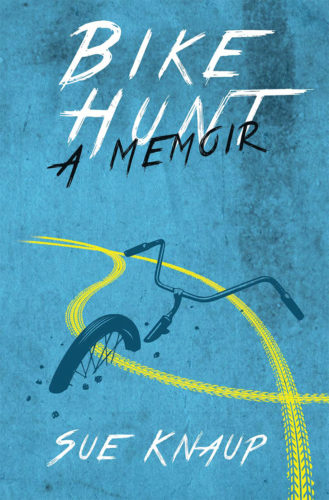By Charles Pekow
Sue Knaup found a unique way to donate bicycles. Some organizations fix up used bikes and donate them to underprivileged children. Some ship them overseas to less wealthy communities. Many of us donate bikes to charity when we get a new one or our children outgrow them.
But whenever she travels, this long-time professional bicycle advocate finds an old bike, fixes it up, rides it around town as her main source of transit, then finds someone who needs a bike and gives it away. She described years of such buys and giveaways in a recently self-published Bike Hunt: A Memoir.
Knaup founded and runs One Street, a non-profit devoted to helping bicycle advocacy groups domestically and internationally.

Her tome tells two stories at once, documenting personal bike hunts/donations and her hard times as executive director of a national bike promotion group called the Thunderhead Alliance (which later morphed into the Washington, DC-based Alliance for Biking & Walking and eventually folded itself into the League of American Bicyclists). About as often as she tells you about her new old bike, she tells you how the board was trying to sabotage her work or get rid of her. Knaup often changes gears in the book so fast that you never know when she’s going from telling you about the latest bike she fixed up to her latest recount of mistreatment or vice versa.
At one point, for instance, she relates to a partially disabled homeless shelter resident she donates a clunker to:
“’I named her the Iron Maiden,’ I said. ‘You feel her weight?’” (Knaup named every bike she bought.)
“’Oh, yeah,’ he said. ‘That’s cool,’ he said with a daring grin as he gazed at all sides of his new ride. ‘That’s the perfect name for her.’
At this, the group erupted into hoots and applause.”
Then without warning, the next paragraph begins “February 2006 arrived too soon and with it the same dread I’d felt before that October board meeting in Chicago.”
The bike buy-and-giveaway log takes us from Knaup’s hometown of Prescott, AZ to Idaho, Germany, Spain and plenty of other destinations, where she roamed wherever she needed to find a two-wheeler, be it a bike outlet, secondhand store or pawn shop. The vehicles obviously needed some tune-ups and other work. Understandably, bike shop owners didn’t want to hand her the tools to do her own repair jobs, but auto service centers, who weren’t losing business by letting someone fix a bike, were more cooperative.
The book shows that you can always find somebody who needs a bike without resorting to Craigslist or Goodwill. Customers ranged from “a somewhat overweight middle-aged man dressed in colorful rags, settled on a bench, his dreadlocks bundled under a billowing knitted cup of yellow, red and green” in Victoria, BC to “a young man working at a candy shop near downtown Munich.”
So far, Knaup has bought and donated 46 bicycles. She records them all on an Excel spreadsheet. She managed to write about every one of them through publication time in the book. “When I did the first book draft, it was a struggle; I wanted every bike hunt in there but I was running out of space. In the last draft, I got every bike hunt in there, even if only just a line,” she said in an interview.
She says she aims to spend about $50 for a bike, though it averages about $40, she estimates, because sometimes she’d find one for $9 or $10. The most she spent totaled $120 in Switzerland because she ran out of time and needed one in a hurry.
While acknowledging her habit requires some mechanical skills and isn’t for everyone, “I pay $50 and have the bike with me all the time,” which beats rentals or bikeshare for price and convenience.
She doesn’t know what happens to the bikes she donates. “One of my rules is I’d make it very clear that as soon as I turned my back, it was their bike and they can do anything the want with it,” she says. But “I wanted to make sure they intended to keep the bike and take care of it. I didn’t want to give it to someone who (figured) ‘I could sell this thing for $20 around the corner.’”
Knaup self-published the book, explaining “I did try going to agents for the big (publishing) houses. They got cold feet because it’s a memoir and memoirs aren’t selling.”
Bike Hunt: A Memoir, 222 pages, paperback, One Street Press, $17.99 plus $5.99 shipping, onestreet.org.








